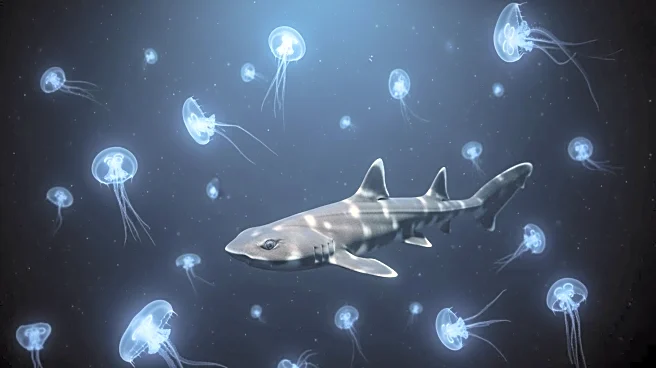What's Happening?
Australian scientists have discovered two new marine species during a research expedition in the Gascoyne Marine Park, located off the coast of Western Australia. Among the findings is the West Australian Lantern
Shark, a bioluminescent species that can grow up to 40cm and is characterized by large eyes and a glowing belly. This shark was found at depths exceeding 600 meters below the ocean's surface. The expedition, conducted by Australia's science agency CSIRO in late 2022, also uncovered a semi-transparent crab about the size of an almond. These discoveries highlight Australia's status as a major biodiversity hotspot, with many species yet to be explored and documented.
Why It's Important?
The discovery of new marine species such as the West Australian Lantern Shark underscores the vast unexplored biodiversity within Australia's waters. This finding is significant for marine biology and conservation efforts, as it adds to the understanding of deep-sea ecosystems and the unique adaptations of species living in extreme environments. The bioluminescent properties of the lantern shark may offer insights into evolutionary biology and the ecological roles of light-producing organisms. Furthermore, these discoveries can inform conservation strategies, emphasizing the need to protect marine habitats from threats such as climate change and human activities.
What's Next?
Following the discovery, researchers will likely continue to study the newly identified species to understand their ecological roles and behaviors. This may involve further expeditions to explore other unexplored regions of the ocean, potentially leading to more discoveries. Conservationists may advocate for increased protection of marine parks and biodiversity hotspots to safeguard these unique species. Additionally, the scientific community may focus on the implications of bioluminescence in marine organisms, exploring potential applications in technology and medicine.
Beyond the Headlines
The discovery of the lantern shark and other deep-sea species raises questions about the ethical considerations of deep-sea exploration and the impact of human activities on marine ecosystems. As scientists uncover more about these species, there may be discussions on balancing exploration with conservation, ensuring that the pursuit of knowledge does not harm the delicate environments these organisms inhabit. The findings also highlight the importance of international collaboration in marine research, as understanding global biodiversity requires shared knowledge and resources.









